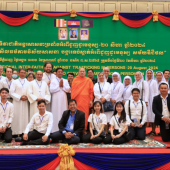Cambodian Catholics pray for the dead, help the poor on Ancestor's Day

"Pchum Ben" (Ancestor's Day) is a time of gratitude to ancestors and living parents and helps the poor in Cambodia.
During Pchum Ben, Catholics bring food to the church to attend Holy Mass for all souls.
The festival was held from September 24 to 26.
According to the history of a church document compiled by Father Francois Ponchaud, a member of the Society of Foreign Missions of Paris, in 1970, the Vatican allowed Catholics in Cambodia to commemorate the dead at the Pchum Ben festival with the people in the country.
Pchum Ben has long been celebrated by the Cambodian people, following the Buddhist tradition for 15 days, of which 14 days are Ben and the 15th is Pchum Day.
Ben is a lump made from sticky rice and another bean. People bring them to a pagoda (Buddhist shrine) and throw them at evil souls before sunrise. They believe that the people who did badly when they died will become evil and hangers-on, and during this time of Pchum Ben, the gate of hell opens for them to receive remit from the living people.
During that time, Cambodians, young and old, go to the pagoda (Buddhist temple compounds) regularly, bringing food and rice to the Buddhist monks.
On Pchum Day, people gather their children and friends at the pagoda for a big ceremony dedicated to the dead.
According to Venerable Vy Sovechea, President of Preah Sihanouk Raja Buddhist University, Battambang Branch, from Ben 1 to Ben 14 is a shift. And on the 15th day is Pchum, which means the time to gather relatives.

The monk continued, "It is a special occasion where everyone values the gathering. It is important because it is an expression of gratitude, and the gathering is a spirit of solidarity, showing love to the living and dead. They may have the opportunity to perform meritorious deeds with the monks, parents, and relatives."
He added that the festival is a way to show gratitude to the ancestors who have passed away, as a tribute to their ancestors, and as an expression of respect and gratitude for the sacrifices of their ancestors. On the other hand, it is a time to meet family members.
"Pchum, my parents want children to go around with them. Sometimes I do not want to go because I have no money, but until that day I want to meet with him," said Sok Khun HEAM, a Catholic in Kampong Kor parish in Kampong Thom province.

Today, Sok Khun, 32, works at an institution of the Catholic Church in Phnom Penh, nearly 200 kilometers from his hometown.
She added that going to church is necessary for this festival.
"On that day, I felt that my grandparents were in front of me and were waiting for me at the church. I cannot miss it," she expressed.
Everywhere, the parishes in Cambodia, a Southeast Asian nation, celebrate this festival, especially on Pchum Day.
In his homily on September 25 at St. Joseph's Church, Chum Kiri, Kampot Province, Father Giovanni Tulino said, "Pchum Ben is a traditional Khmer festival, but our parish also offers Mass to pray for and commemorate the dead because in the Catholic community there is also a ceremony called All Souls Day."
On November 2, every Catholic Church in the world celebrates the Day of All Souls.
At St. Joseph Chum Kiri Church, about 110 km from Phnom Penh, the Mass was joined by local Buddhist people.

Wearing a white shirt and blue pants and holding a drain plate, 27-year-old Long Chandara, a Buddhist who came to the Mass, said that although he was not a Catholic, he believed the ritual was right by doing it with heart and generosity, and this merit would reach the dead as well.
In this ceremony, Chandara wants to know what the Catholics are doing on this Pchum Ben Day.
He added: "I feel strange and think that Catholics love and care for the people around them, especially giving alms to grandparents, elderly people, and eating together. I feel warm here. "
Ms. Ny SOY, 45, a parishioner at Chum Kiri, said that the presence of Buddhist people in the church shows that the Good News is spreading to others who do not know God yet and that it is inter-religious dialogue.
In his homily at the Treng Trayeung Parish on September 24, Bishop Olivier Schitthaeusler, Apostolic Vicar of Phnom Penh, said, "Today, we pray for the dead to be cared for and forgiven by God to see God with their own eyes."
The Bishop reminded us that all Catholics should always prepare themselves because irregular life can lead to illness or traffic accidents without knowing in advance. But the most important things in daily life are to take care of the sick and prisoners, give food to the hungry, give clothes to the naked, and arrange a proper funeral for the dead.
On the occasion of Pchum Ben, Catholic people with the priests go to graves to sprinkle holy water and pray for souls. Each church collects donations from the parishioners to buy some materials and food for the poor and elderly.
Radio Veritas Asia (RVA), a media platform of the Catholic Church, aims to share Christ. RVA started in 1969 as a continental Catholic radio station to serve Asian countries in their respective local language, thus earning the tag “the Voice of Asian Christianity.” Responding to the emerging context, RVA embraced media platforms to connect with the global Asian audience via its 21 language websites and various social media platforms.














